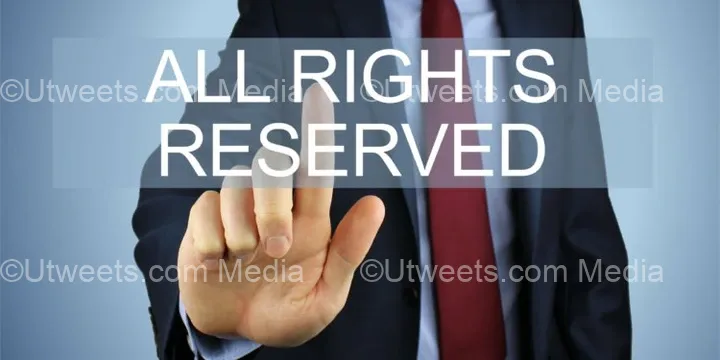Have you ever noticed the phrase “All Rights Reserved” at the bottom of a website or in the fine print of a book? You may have wondered what exactly those three words mean and why they’re so ubiquitous. As a content creator or consumer, understanding this common copyright notice is essential. ...Tap To Read The Full Story Here | ..Tap To Read The Full Story Here...
All Rights Reserved serves as a clear declaration that the creator retains all legal rights to their work. But what specific protections does it provide? And is it always necessary in today’s digital landscape? In this article, you’ll discover the meaning, implications, and evolving relevance of the phrase “All Rights Reserved.”
What is Meant by “All Rights Reserved”?
The phrase “All Rights Reserved” is a formal declaration that asserts copyright protection over creative works. When you see this statement, it means the copyright holder is reserving all rights provided under applicable copyright laws. This includes the exclusive right to reproduce, distribute, perform, display, and create derivative works based on the original content.
Scope of Protection
“All Rights Reserved” covers a wide range of intellectual property, including:
Literary works (books, articles, poems)
Musical compositions and recordings
Visual artworks (paintings, photographs, sculptures)
Films and other audiovisual content
Software and digital creations
By using this phrase, creators are effectively saying, “I own this work, and you need my permission to use it in any way.”
The term originated from the Buenos Aires Convention of 1910, which required this specific phrase for copyright protection in some countries. While it’s no longer legally necessary in most jurisdictions due to international copyright agreements, many creators still use “All Rights Reserved” to clearly communicate their ownership and intent to protect their work.
In today’s digital age, where content can be easily shared and reproduced, this declaration serves as a reminder that unauthorized use may result in legal consequences. However, it’s important to note that fair use provisions still apply, allowing limited use of copyrighted material without permission for purposes such as criticism, commentary, or education.
The Origin and History of the Term
The phrase “All Rights Reserved” has a rich history dating back to the early 20th century. This legal statement emerged as a crucial tool for copyright protection in an era of expanding international trade and intellectual property concerns.
The origin of “All Rights Reserved” can be traced to the Berne Convention for the Protection of Literary and Artistic Works in 1886. This international agreement established copyright protection among its signatories. However, some countries, including the United States, were not initial participants.
In 1910, the Buenos Aires Convention was established to address copyright protection in the Americas. This treaty required a formal declaration of copyright, leading to the widespread use of “All Rights Reserved” as a standard notice.
As international copyright laws evolved, “All Rights Reserved” became a universal symbol of copyright protection. It served as a clear statement that the creator was asserting all available rights under copyright law.
In the digital age, the term has taken on new significance. With the ease of content sharing online, “All Rights Reserved” continues to play a crucial role in protecting intellectual property. However, alternative licensing models like Creative Commons have also emerged, offering creators more flexible options for sharing their work while retaining certain rights.
Today, while “All Rights Reserved” is no longer legally required in many jurisdictions, it remains a powerful and widely recognized statement of copyright protection. Its history reflects the ongoing challenges and adaptations in safeguarding intellectual property in an ever-changing global landscape.
Legal Implications of Using “All Rights Reserved” in Nigeria
In Nigeria, the use of “All Rights Reserved” carries significant legal weight under the Copyright Act of 2004. This phrase indicates that the creator retains all rights granted by copyright law, including the exclusive right to reproduce, distribute, and adapt the work. It’s important to note that while copyright protection is automatic upon creation in Nigeria, using “All Rights Reserved” serves as a clear statement of intent to enforce these rights.
The Nigerian Copyright Commission (NCC) is responsible for enforcing copyright laws. When “All Rights Reserved” is used, it strengthens the creator’s position in legal disputes. Infringement can lead to severe penalties, including fines up to ₦1,000,000 for individuals and ₦5,000,000 for corporate bodies. In some cases, offenders may face imprisonment for up to five years.
Despite the comprehensive protection “All Rights Reserved” implies, Nigerian law does recognize some exceptions. Fair use provisions allow limited use of copyrighted material without permission for purposes such as criticism, commentary, news reporting, teaching, scholarship, or research. However, these exceptions are narrowly interpreted, and the burden of proving fair use often falls on the user.
Nigeria is a signatory to several international copyright treaties, including the Berne Convention and the WIPO Copyright Treaty. This means that works marked “All Rights Reserved” in Nigeria are also protected in other member countries, enhancing the global reach of copyright protection for Nigerian creators and rights holders.
When to Use “All Rights Reserved” in Nigeria
These are some examples of when to use the term “All Rights Reserved.”
Published Literary Works
When you’ve authored a book, article, or other written piece in Nigeria, using “All Rights Reserved” protects your exclusive rights to reproduce, distribute, and adapt the work. This declaration is particularly crucial for Nigerian authors seeking to safeguard their intellectual property in a rapidly evolving digital landscape.
Musical Compositions and Recordings
For Nigerian musicians and producers, applying “All Rights Reserved” to original songs and recordings is essential. This phrase helps prevent unauthorized use or sampling of your music, ensuring you retain control over how your creations are used and monetized within Nigeria’s vibrant music industry.
Artistic Creations and Visual Works
Nigerian artists, photographers, and graphic designers should use “All Rights Reserved” in their visual creations. This declaration helps protect against unauthorized reproduction or modification of artwork, photographs, and designs, preserving the creator’s unique vision and potential revenue streams.
Software and Digital Products
In Nigeria’s growing tech sector, developers and companies should apply “All Rights Reserved” to software, apps, and digital products. This helps prevent unauthorized copying, modification, or distribution of code and digital assets, safeguarding investments in innovation and development.
Corporate Branding and Logos
Nigerian businesses should use “All Rights Reserved” on their logos, slogans, and brand materials. This declaration helps protect the company’s visual identity and prevents competitors from using similar designs or messaging, maintaining brand uniqueness in the marketplace.
Academic and Research Publications
For Nigerian scholars and researchers, applying “All Rights Reserved” to academic papers, theses, and research findings is crucial. This helps ensure proper attribution and prevents unauthorized reproduction or distribution of scholarly work, maintaining the integrity of Nigeria’s academic and research communities.
Examples of Proper Use of the Term in Nigeria
Copyright Notices on Books
When publishing a book in Nigeria, authors often include the phrase “All Rights Reserved” on the copyright page. This statement informs readers that the author retains all legal rights to the work, including reproduction, distribution, and adaptation. For instance, a Nigerian novelist might print: “© 2024 [Author Name]. All Rights Reserved.” This protects their creative content from unauthorized use.
Music Album Releases
Nigerian musicians frequently use “All Rights Reserved” on their album covers and digital releases. This declaration safeguards their musical compositions and recordings from unlawful copying or sampling. A popular Afrobeats artist might include: “℗ & © 2024 [Record Label]. All Rights Reserved.” This notation preserves their rights to perform, distribute, and license their music.
Software Development
In Nigeria’s growing tech industry, software developers often employ “All Rights Reserved” to protect their proprietary code. When launching a new app or program, a Nigerian tech company might display: “© 2024 [Company Name]. All Rights Reserved.” This statement helps prevent unauthorized copying or modification of their software.
Film and Television Productions
Nigerian filmmakers use “All Rights Reserved” to protect their audiovisual works. At the end of a Nollywood movie or TV show, you might see: “© 2024 [Production Company]. All Rights Reserved.” This declaration covers all aspects of the production, including screenplay, cinematography, and editing, safeguarding against illegal distribution or adaptation.
Academic Publications
Nigerian scholars and research institutions often include “All Rights Reserved” in their published works. For example, a university press might print: “© 2024 [University Name] Press. All Rights Reserved.” This protects their academic content from unauthorized reproduction or distribution, ensuring proper attribution and maintaining the integrity of their research.
Alternatives to Using “All Rights Reserved” in Nigeria
These are some alternatives to using the term “All Rights Reserved.”
Creative Commons Licenses
Creative Commons licenses offer a flexible alternative to “All Rights Reserved” in Nigeria. These licenses allow creators to specify how others can use their work while retaining some rights. For instance, the “Attribution” license (CC BY) permits others to distribute, remix, and build upon your work, even commercially, as long as they credit you. This fosters collaboration and wider dissemination of creative works.
Public Domain Dedication
For those wishing to relinquish all copyright claims, dedicating work to the public domain is an option in Nigeria. This can be done using tools like Creative Commons’ CC0 (No Rights Reserved) dedication. By choosing this route, creators allow their work to be freely used, modified, and distributed by anyone without restrictions. This approach can significantly contribute to the public good and cultural commons.
Open Source Licenses
Open source licenses, while primarily used for software, can also apply to other creative works in Nigeria. Licenses like the GNU General Public License (GPL) or the MIT License allow others to use, modify, and distribute the work, provided they adhere to specific conditions. These licenses promote transparency, collaboration, and innovation, particularly in technology-related fields.
Customized Copyright Notices
Nigerian creators can craft personalized copyright notices that specify permitted uses of their work. For example, “© [Year] [Name]. Some rights reserved. Reproduction allowed for non-commercial purposes with attribution.” This approach allows creators to tailor protection levels to their specific needs, balancing control with accessibility. It’s crucial to ensure such notices align with Nigerian copyright law to maintain legal validity.
Registering Your Work for Copyright Protection in Nigeria
Registering your work for copyright protection in Nigeria is a crucial step in safeguarding your intellectual property. Here’s a comprehensive guide to help you navigate the process:
Step 1: Prepare Your Work
Before initiating the registration process, ensure your work is in its final form. This could be a manuscript, musical composition, artwork, or any other original creation. Make sure it’s well-documented and ready for submission.
Step 2: Gather Required Documents
Collect all necessary documents for the registration process. These typically include:
A completed application form
Copies of your work (usually two)
Proof of Nigerian citizenship or residency
Payment for the registration fee
Step 3: Submit Your Application
Visit the Nigerian Copyright Commission (NCC) office or their official website to submit your application. Ensure all forms are filled out accurately and completely to avoid delays.
Step 4: Pay the Registration Fee
Pay the required registration fee as specified by the NCC. The amount may vary depending on the type of work you’re registering.
Step 5: Wait for Processing
After submission, the NCC will review your application. This process can take several weeks to a few months, depending on their current workload.
Step 6: Receive Your Certificate
Once your application is approved, you’ll receive a certificate of registration. This document serves as proof of your copyright and can be invaluable in case of future disputes.
Remember, while copyright protection in Nigeria is automatic upon the creation of an original work, registering your copyright provides additional benefits and stronger legal protection. It’s a wise investment for creators looking to secure their rights and potentially monetize their work.
Enforcing Your Rights as a Copyright Holder
As a copyright holder, you possess exclusive rights to your creative work. The “All Rights Reserved” statement serves as a clear declaration of these rights. It’s crucial to understand that your work is automatically protected under copyright law from the moment of creation, even without formal registration.
Steps to Enforce Your Copyright
Document your work: Keep detailed records of your creative process, including drafts and dates of creation.
Register your copyright: While not mandatory, registering with NCC provides additional legal benefits.
Monitor for infringement: Regularly search online for unauthorized uses of your work.
Issue cease and desist letters: When you discover infringement, send a formal request to stop the unauthorized use.
Consider legal action: If informal methods fail, consult with an intellectual property attorney about pursuing a lawsuit.
Leveraging Technology for Protection
In today’s digital age, technological tools can aid in enforcing your rights. Digital watermarks, blockchain registration, and online monitoring services can help track and protect your work across the internet. These methods complement the legal protections afforded by the “All Rights Reserved” statement.
Balancing Enforcement and Fair Use
While vigorously protecting your rights is important, it’s equally crucial to understand the concept of fair use. This legal doctrine allows limited use of copyrighted material without permission for purposes such as criticism, commentary, or education. Striking a balance between enforcing your rights and respecting fair use can help maintain your reputation while protecting your intellectual property.
Frequently Asked Questions
These are some frequently asked questions and answers about the term All Rights Reserved.
What exactly does “All Rights Reserved” mean?
“All Rights Reserved” is a copyright notice that indicates the copyright holder retains all rights provided by copyright law. This includes the rights to reproduce, distribute, perform, display, and create derivative works based on the copyrighted material. By using this phrase, creators assert their intention to exercise all available protections under copyright law.
Is “All Rights Reserved” legally necessary?
While not legally required in most countries, including the United States, “All Rights Reserved” serves as a clear statement of intent. It informs others that the creator wishes to maintain all copyright protections. However, since the Buenos Aires Convention of 1910, most nations recognize copyright protection without this specific phrase.
Can I use material marked “All Rights Reserved”?
Generally, you need explicit permission from the copyright holder to use material marked “All Rights Reserved.” This applies to the reproduction, distribution, or creation of derivative works. However, fair use exceptions may allow limited use for purposes such as criticism, commentary, news reporting, teaching, or research, depending on your jurisdiction’s specific laws.
How does “All Rights Reserved” differ from Creative Commons licenses?
Unlike “All Rights Reserved,” which retains all rights, Creative Commons licenses allow creators to grant some rights to the public while reserving others. These licenses offer more flexibility, enabling creators to specify how others can use their work while still maintaining some control over its use and distribution.
Conclusion
In conclusion, “All Rights Reserved” serves as a clear declaration of copyright protection for creative works. By using this statement, you assert your exclusive rights as the creator and put others on notice that permission is required for use. While not legally necessary in most cases, it can deter infringement and strengthen your position if legal action becomes necessary.Do You Want To See The Video Of This Content? Click Here, The Full .Video IS HE.RE: Don’t Forget to visit the website for more fresh and original updates To Watch The Video. 👉 …Viêw _More. Also Here Thanks.
As you produce original content, consider including this phrase to safeguard your intellectual property. However, also be aware of alternative licensing options that may better suit your goals for sharing and distribution. Ultimately, understanding your rights as a creator empowers you to make informed decisions about protecting and sharing your work..[1…READ MORE FROM SOURCE ↔️.2]



